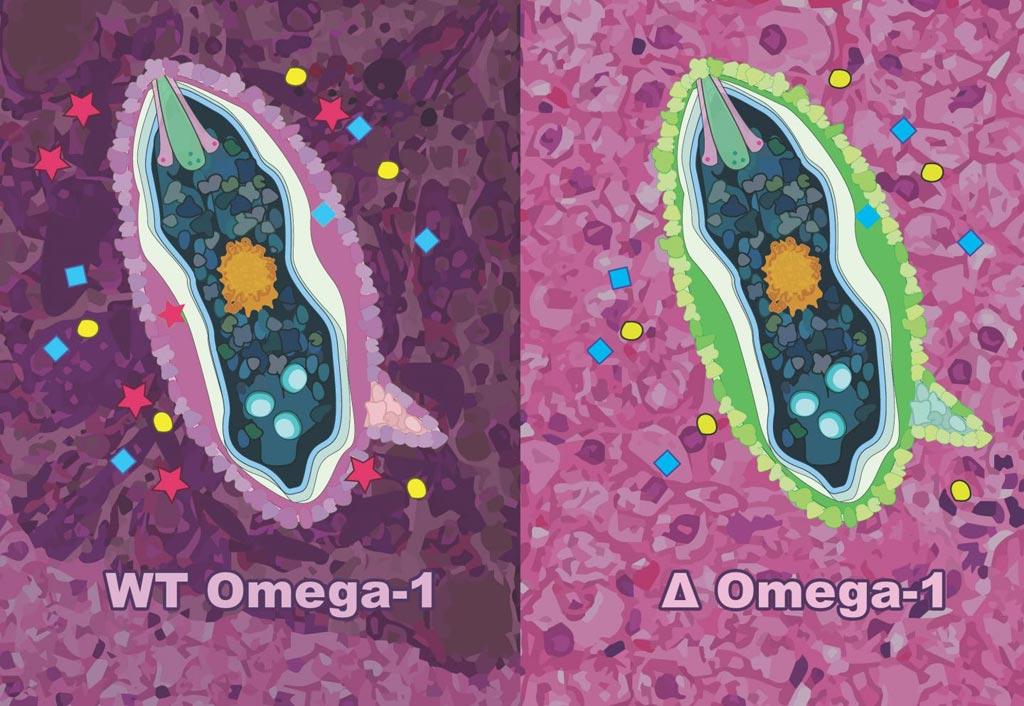Gene Editing Reduces Symptoms of Parasite Infection in Models
By LabMedica International staff writers
Posted on 29 Jan 2019
Tropical disease researchers used the CRISPR/Cas9 genome-editing tool to interfere with the ability of certain parasitic worms to invade and reproduce in rodent model systems.Posted on 29 Jan 2019
CRISPR/Cas9 is regarded as the cutting edge of molecular biology technology. CRISPRs (clustered regularly interspaced short palindromic repeats) are segments of prokaryotic DNA containing short repetitions of base sequences. Each repetition is followed by short segments of "spacer DNA" from previous exposures to a bacterial virus or plasmid. Since 2013, the CRISPR/Cas9 system has been used in research for gene editing (adding, disrupting, or changing the sequence of specific genes) and gene regulation. By delivering the Cas9 enzyme and appropriate guide RNAs (sgRNAs) into a cell, the organism's genome can be cut at any desired location. The conventional CRISPR/Cas9 system from Streptococcus pyogenes is composed of two parts: the Cas9 enzyme, which cleaves the DNA molecule and specific RNA guides that shepherd the Cas9 protein to the target gene on a DNA strand.

Image: Researchers \"knocked out\" the omega-1 ribonuclease protein using CRISPR/Cas9 and found that it greatly reduced the impact of schistosomiasis (Photo courtesy of George Washington University).
Investigators at George Washington University (Washington, DC, USA) employed CRISPR/Cas9 to modify the genomes of the parasites Schistosoma mansoni and Opisthorchis viverrini. S. mansoni causes schistosomiasis, in which freshwater worms enter the body by burrowing through the skin. The parasites then move through the bloodstream to lodge primarily in the liver where they lay eggs and reproduce. O. viverrini is a river fluke infection transmitted through traditional Southeast Asian cuisines. Infection by this parasite has been identified as a major risk factor for the development of usually fatal bile duct cancer (cholangiocarcinoma).
Each of these parasites produces and secretes characteristic proteins during the reproductive process that cause damage to surrounding host tissues. In the case of S. manosi, one such protein is the enzyme omega-1 ribonuclease, while O. viverrini parasites produce the growth factor, liver fluke granulin (Ov-grn-1).
In two papers published in the January 15, 2019, online edition of the journal eLife the investigators described how using CRISPR/Cas9 to eliminate the gene for omega-1 ribonuclease in S. mansoni eggs and the gene for Ov-grn-1 in O. viverrini affected infection by these organisms in rodent models.
Gene-edited Schistosoma eggs failed to polarize Th2 cytokine responses in macrophage/T-cell co-cultures, while the volume of pulmonary granulomas surrounding omega1-mutated eggs following tail-vein injection into mice was vastly reduced. In O. viverrini gene editing resulted in rapid depletion of Ov-grn-1 transcripts and the encoded Ov-grn-1 protein. Gene-edited parasites colonized the biliary tract of hamsters and developed into adult flukes, but the infection resulted in reduced pathology as evidenced by attenuated biliary hyperplasia and fibrosis.
"The genes we "knocked out" using CRISPR/Cas9 resulted in markedly diminished symptoms of infection in our animal models," said one of the senior authors, Dr. Paul Brindley, professor of microbiology, immunology, and tropical medicine at George Washington University. "Our research also showed that this revolutionary new biomedical procedure -- CRISPR/Cas9 -- can be adapted to study helminth parasites, which are a major public health problem in tropical climates."
"These neglected tropical diseases affect more than a quarter of a billion people primarily living in Southeast Asia, sub-Saharan Africa, and Latin America," said Dr. Brindley. "CRISPR/Cas9 is a tool that may be used to limit the impact of these infections. As we work to better understand how these parasites invade and damage our bodies through this new technology, we will find new ideas for treatment and disease control."
Related Links:
George Washington University













